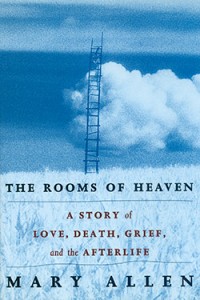A memoir that is intimate and gripping, literary and suspenseful, The Rooms of Heaven is a love story, an anatomy of a suicide, an account of grief and healing, and a wholly original exploration of life after death.
This book was chosen as one of the best nonfiction books of 2014 by Tin House. It was included in the list even though it’s not new — it was published in 1999 — but it was “new to [the editor who chose it] in 2014.”
From The Rooms of Heaven:
Books that tell stories about people dying usually end with the death. I used to pick up those books during a certain time in the months after Jim died, read a few pages, and toss them aside. They didn’t have what I wanted. Neither did paperbacks about how to grieve or biographies of famous widows or self-help books for suicide survivors. But I read them all. I went to the library almost every day, walking down Washington Street, carrying my white burlap sack bulging with yesterday’s library books, feeling thin-skinned and vulnerable, shy and sad in the face of the bold, loud, colorful world.
When I got to the library I’d dump the books in the returns bin and go upstairs to the nonfiction section. Always, at that instant, crossing the floor to the stacks, my depression would lift and I’d have a momentary feeling of excitement; always, I’d think, just for an instant: Something good is about to happen.
I kept having that feeling, like a little light that goes on and off for no particular reason, throughout the first two months after Jim’s death. It would come to me at odd moments: while I was playing solitaire, about to place the red ten on top of the black jack, or as I was bending over to pluck a dead leaf off a plant in my living room. And it always happened in the library. The rest of the time I was utterly miserable, my heart shattered into a million pieces. I felt sick, injured, decrepit, hopeless. But there were those moments of excitement, of irrational expectation… Maybe it’s just that hope dies hard, especially when the hoper is in the habit of denial; maybe it was just more love addiction and self-delusion. But it didn’t feel like that. It felt sweeter, stranger, more disorienting, like seeing something good that disappeared so fast you didn’t even know you’d seen it, or waking from a brief afternoon nap with the feeling that you’d just come back from someplace far away you couldn’t remember going to.
Mostly, when I had that feeling at the library, I was on the trail of what my friend Patty and I called boojie books, the kind of book found in Prairie Lights bookstore in the non-ordinary reality section.. I love that part of the bookstore. After Jim died I used to stand in front of it with a feeling of excitement, of expectation, as if, even though part of me knew I wouldn’t, part of me thought I was going to find the secret to life, death, where Beaman went, maybe even Jim Beaman himself in those books. Of course I didn’t, but in a strange way the looking, the half expecting to find him – to find something, at least – gave me a little of the same satisfaction.
And in the end I came up with some theories about life, death, where Beaman went. Enough to put my mind at rest. I don’t really know, of course; I don’t claim to have the answers.
But one thing I know for sure: Death is not the end of the story.
“Allen’s hypnotic memoir is sad, mysterious, and beautiful.”
-Booklist
